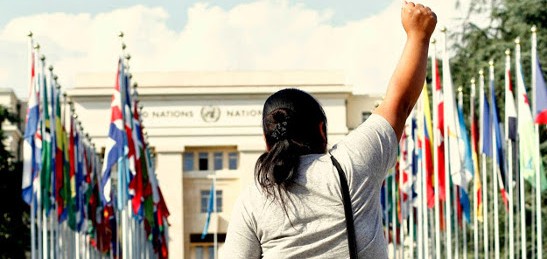28th October 2020
Source: Asia Task Force on the Legally-Binding Instrument (ATF)

Amidst the challenges posed by the Covid-19 pandemic, the negotiations towards a legally binding instrument on transnational corporations and other business enterprises and human rights commenced Monday, 26th of October in Geneva, with participation from States, business groups and civil society organizations enabled through various online platforms.
Following the mandate of UN Human Rights Council (UNHRC) Resolution 26/9, States are negotiating at this 6th session of the open-ended intergovernmental working group the 2nd revised draft of the text prepared by Ecuador and released in August 2020. 6 Asian States (China, India, Indonesia, Pakistan, Philippines and Vietnam) supported the resolution in 2014.
Civil society organizations have since 2014 been actively engaged, pushing and intervening in the process. They have put forward concrete proposals towards a robust international legally binding instrument that would address the gaps in international human rights law on holding transnational corporations accountable for human rights abuses. They have highlighted the need to put at the center of the talks, the rights of victims and the importance of strengthening mechanisms to ensure justice for rights holders.
Speaking on behalf of the Global Campaign to Reclaim Peoples Sovereignty, Dismantle Corporate Power and Stop Impunity (Global Campaign), Monica Vargas of the Transnational Institute framed the talks in the context of the Covid pandemic by saying that in a situation where “public health systems have been weakened by the increasingly privatization of health as well as the outsourcing of services by the state, the Treaty could be a tool to protect people’s right to health from this marketization of health public service.” The Global Campaign drew attention to the urgent need to find effective mechanisms and tools for states to “block the abuses – that then became violations – of health corporations (both pharma and health insurance) in relation to the right of people to access to health system and medicines to tackle the crisis produced by the Covid 19. “
Participating remotely, several activists from Asia representing key organizations and networks made key interventions during the first two days of the negotiations. The inputs underscored the realities faced by peoples and communities and the urgency for stronger instruments to ensure greater corporate accountability and justice for victims of human rights abuses and violations.
A central issue in these negotiations is ensuring that there is adequate protection for the rights of victims of corporate abuse. Speaking on behalf of Food First Information and Action Network (FIAN) International, Rachmi Hertanti of Indonesia for Global Justice and the Asia Task Force on the LBI (ATF), drew attention to the need to look at the rights of all affected communities and individuals and emphasize that effective remedies and reparation measures should take into account the differentiated impacts of human rights abuses on specific groups in order to respond adequately to these impacts and their particular needs especially to consider harm that could appear in the future.
Mai Taqueban premised her interventions made on behalf of Friends of the Earth International, on the realities faced by communities struggling against transnational corporations that have caused irreparable damage to our natural resources and numerous human rights violations in the conduct of their business. In the Philippines, for example, a transnational mining corporation has been eluding continuing liability for the past two decades.
On the scope of the future instrument, Taqueban asserted the need to harmonize “the terms used when referring to transnational corporations and other enterprises of transnational character throughout the Treaty so as not to compromise the coherence of the Treaty.” This concrete amendment is so important in the context of the continuing debate over the scope with some states pushing to limit the scope to TNCs as mandated under Resolution 26/9 while others are attempting to expand the scope to include all business enterprises. An expanded scope could further divert attention away from the abuses associated with operations of TNCs.
Labor leader from the Philippines Josua Mata, representing SENTRO, who spoke on behalf of CETIM and the Global Campaign further underscored this point in his intervention on the scope: “We believe that extending the of scope of the instrument to all businesses – big or small, local and transnational – deviates from the real problem, which is the architecture of impunity that TNCs managed to create over the years.” He elaborated further on the need to focus on TNCs, “TNCs are able to operate outside their home state, insulated from legal liability, through various entities which do the dirty work for them. For decades, TNCs have been running roughshod over the rights of many workers, especially those working in their supply chains, by using their immense market leverage to squeeze profits.” Mata put forward the concrete proposal for the instrument to “apply to TNCs and other business enterprises of transnational character, including their subsidiaries, branches, subcontractors, suppliers, and all other entities in their global value chains (GVC) or global supply chains.”
Third World Network, through its legal staff Tony Salvador, spoke on behalf of the Corporate Accountability International and the Global Campaign. He emphasized that the main purpose of the treaty is to regulate TNCs by making them legally liable for human rights violations. He also reiterated that concrete obligations for TNCs to respect human rights must be clearly included in the treaty.
The Asia Task Force has been actively campaigning for the legally-binding instrument, engaging governments on these negotiations and building greater public awareness on the need for stronger mechanisms at the international level on corporate accountability. ATF’s members are part of the Global Campaign and the Treaty Alliance. #
Asia Task Force on the Legally-Binding Instrument (ATF)
Rachmi Hertanti @ rachmi.hertanti @ gmail.com
Joseph Purugganan @ josephp @ focusweb.org
